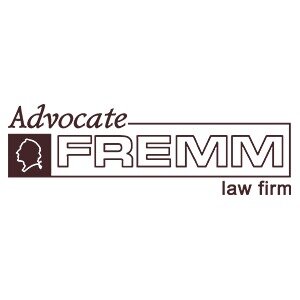Best Tax Increment Financing Lawyers in St Petersburg
Share your needs with us, get contacted by law firms.
Free. Takes 2 min.
List of the best lawyers in St Petersburg, Russia
About Tax Increment Financing Law in St Petersburg, Russia
Tax Increment Financing (TIF) is a public financing method utilized to stimulate economic development in specific areas by using future tax revenues. In St Petersburg, Russia, TIF is employed as a strategy to promote urban renewal, infrastructure development, and the revitalization of underdeveloped areas. Local governments often collaborate with private developers to attract investment through TIF, which aims to increase property values and generate additional tax revenue to fund projects. Understanding the legal framework surrounding TIF is crucial for stakeholders, as it involves navigating local statutes and regulations.
Why You May Need a Lawyer
Individuals and businesses may require legal assistance with Tax Increment Financing for several reasons:
- Complex Legal Framework: Understanding the intricate legal documents and agreements involved in TIF projects can be challenging.
- Compliance: Ensuring compliance with local laws and regulations is essential to avoid legal disputes.
- Negotiations: Legal experts can help negotiate the terms of TIF agreements, ensuring fair terms and protecting your interests.
- Dispute Resolution: Disagreements between stakeholders may arise, necessitating legal guidance to resolve conflicts amicably.
- Project Financing: Lawyers can provide insights into structuring financing arrangements that align with legal requirements and financial goals.
Local Laws Overview
In St Petersburg, the legal framework for Tax Increment Financing is intertwined with both federal and local regulations. Key aspects include:
- Authorization: TIF projects must receive approval from local governmental bodies, which evaluate the feasibility and potential benefits of proposed developments.
- Increment Calculation: The increase in tax revenue, or increment, is calculated based on current and projected property assessments.
- Fund Allocation: Revenue generated from the increment is allocated to finance eligible projects, including infrastructure improvements, community services, and redevelopment initiatives.
- Duration: TIF agreements have defined time frames, usually ranging from 15 to 25 years, to allow for investment recovery and project completion.
- Transparency Requirements: There are mandatory reporting and public disclosure obligations to ensure transparency and accountability in the use of tax increment funds.
Frequently Asked Questions
Who can initiate a TIF project in St Petersburg?
TIF projects can be initiated by local government agencies, private developers, or public-private partnerships seeking to rehabilitate designated areas.
What types of projects typically qualify for TIF funding?
Projects geared toward property development, infrastructure enhancement, and community revitalization, such as new housing, roads, and public amenities, often qualify for TIF financing.
How is the tax increment determined?
The tax increment is the difference between the amount of property tax revenue generated before development and the anticipated revenue after the project is completed.
Are there any risks associated with TIF?
Yes, TIF involves certain risks, such as underestimated costs, unanticipated economic downturns affecting tax revenue, and potential legal disputes among stakeholders.
Can TIF funds be used for any type of expense?
No, TIF funds are typically restricted to specific uses related to project development and are regulated by local and regional laws.
What happens if a TIF project fails to meet its goals?
If a project does not achieve its intended outcomes, it may face financial challenges, necessitating renegotiations or reevaluation of terms and potentially impacting future tax revenue.
How are local residents affected by TIF projects?
Residents may benefit from enhanced infrastructure and services but could face potential impacts such as changes in property taxes and community dynamics.
Is there public input in TIF decisions?
Public hearings and consultations are often part of the approval process, allowing residents to provide input and express concerns regarding proposed projects.
How can a lawyer assist in resolving TIF disputes?
Lawyers can offer representation in negotiations or litigation, mediate disputes, advise on compliance, and help protect your rights throughout the process.
What should be considered when choosing a lawyer for TIF-related issues?
Look for legal professionals with experience in local real estate and development law, a strong track record in TIF projects, and familiarity with the regulatory environment in St Petersburg.
Additional Resources
For more information on Tax Increment Financing in St Petersburg, consider reaching out to the following resources:
- Local Government Departments: Often handle TIF project approvals and provide guidance on legal compliance.
- Business Associations: May offer resources and networking opportunities for developers and investors interested in TIF projects.
- Legal Aid Organizations: Provide assistance for understanding TIF laws and accessing qualified legal counsel.
Next Steps
If you require legal assistance with Tax Increment Financing in St Petersburg, consider taking the following steps:
- Research: Gather preliminary information on local laws and understand the specifics of your situation.
- Consultation: Schedule an initial consultation with a lawyer specializing in TIF to discuss your needs and objectives.
- Documentation: Prepare and organize all relevant documents, such as contracts, financial statements, and project proposals.
- Engagement: Retain a lawyer or legal team with the expertise necessary to advocate for your interests effectively.
- Collaboration: Work closely with your legal counsel to ensure compliance and to strategize on project execution and dispute resolution.
Lawzana helps you find the best lawyers and law firms in St Petersburg through a curated and pre-screened list of qualified legal professionals. Our platform offers rankings and detailed profiles of attorneys and law firms, allowing you to compare based on practice areas, including Tax Increment Financing, experience, and client feedback.
Each profile includes a description of the firm's areas of practice, client reviews, team members and partners, year of establishment, spoken languages, office locations, contact information, social media presence, and any published articles or resources. Most firms on our platform speak English and are experienced in both local and international legal matters.
Get a quote from top-rated law firms in St Petersburg, Russia — quickly, securely, and without unnecessary hassle.
Disclaimer:
The information provided on this page is for general informational purposes only and does not constitute legal advice. While we strive to ensure the accuracy and relevance of the content, legal information may change over time, and interpretations of the law can vary. You should always consult with a qualified legal professional for advice specific to your situation.
We disclaim all liability for actions taken or not taken based on the content of this page. If you believe any information is incorrect or outdated, please contact us, and we will review and update it where appropriate.















